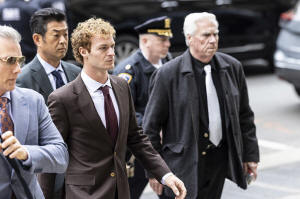Veteran Daniel Penny is acquitted in NYC subway chokehold case over
Jordan Neely's death
 Send a link to a friend
Send a link to a friend
 [December 10, 2024]
By JENNIFER PELTZ [December 10, 2024]
By JENNIFER PELTZ
NEW YORK (AP) — A Marine veteran who used a chokehold on an agitated
subway rider was acquitted on Monday in a death that became a prism for
differing views about public safety, valor and vigilantism.
A Manhattan jury cleared Daniel Penny of criminally negligent homicide
in Jordan Neely ’s 2023 death. A more serious manslaughter charge was
dismissed last week because the jury deadlocked on that count.
Penny, who had shown little expression during the trial, briefly smiled
as the verdict was read. While celebrating later with his attorneys, he
said he felt “great.”
Both applause and anger erupted in the courtroom, and Neely's father and
two supporters were ushered out after audibly reacting. Another person
also left, wailing with tears.
“It really, really hurts,” Neely’s father, Andre Zachery, said outside
the courthouse. “I had enough of this. The system is rigged."
The case amplified many American fault lines, among them race, politics,
crime, urban life, mental illness and homelessness. Neely was Black.
Penny is white.
There were sometimes dueling demonstrations outside the courthouse,
including on Monday. High-profile Republican politicians portrayed Penny
as a hero while prominent Democrats attended Neely’s funeral.

Penny’s attorneys argued he was protecting himself and other subway
passengers from a volatile, mentally ill man who was making alarming
remarks and gestures.
Penny “finally got the justice he deserved,” one of his lawyers, Thomas
Kenniff, said while celebrating the outcome with him at a downtown
Manhattan pub.
Manhattan District Attorney Alvin Bragg, a Democrat whose office brought
the case, said prosecutors “followed the facts and the evidence from
beginning to end” and respect the verdict.
The anonymous jury, which had started deliberating Tuesday, was escorted
out of court to a van.
Penny, 26, served four years in the Marines and went on to study
architecture.
Neely, 30, was a sometime subway performer with a tragic life story: His
mother was killed and stuffed in a suitcase when he was a teenager.
As a younger man, Neely did Michael Jackson tributes — complete with
moonwalks — on the city’s streets and subways. But Neely also struggled
with mental illness after losing his mother, whose boyfriend was
convicted of murdering her.
He subsequently was diagnosed with depression and schizophrenia, was
repeatedly hospitalized, and used the synthetic cannabinoid K2 and
realized it negatively affected his thinking and behavior, according to
medical records seen at the trial. The drug was in his system when he
died.
Neely told a doctor in 2017 that being homeless, living in poverty and
having to “dig through the garbage” for food made him feel so hopeless
that he sometimes thought of killing himself, hospital records show.
About six years later, he boarded a subway under Manhattan on May 1,
2023, hurled his jacket onto the floor, and declared that he was hungry
and thirsty and didn’t care if he died or went to jail, witnesses said.
Some told 911 operators that he tried to attack people or indicated he’d
harm riders, and several testified that they were afraid.
[to top of second column]
|

Daniel Penny, center, arrives at criminal court, Monday, Dec. 9,
2024, in New York. (AP Photo/Stefan Jeremiah)

Neely was unarmed, with nothing but a muffin in his pocket, and
didn’t touch any passengers. One said he made lunging movements that
alarmed her enough that she shielded her 5-year-old from him.
Penny came up behind Neely, grabbed his neck, took him to the floor
and “put him out,” as the veteran told police at the scene.
Passengers' video showed that at one point during the roughly
six-minute hold, Neely tapped an onlooker’s leg and gestured to him.
Later, he briefly got an arm free. But he went still nearly a minute
before Penny released him.
“He’s dying,” an unseen bystander said in one video. “Let him go!”
A witness who stepped in to hold down Neely’s arms testified that he
told Penny to free the man, though Penny’s lawyers noted the
witness’ story changed significantly over time.
Penny told detectives shortly after the encounter that Neely
threatened to kill people and the chokehold was an attempt to
“de-escalate” the situation until police could arrive. The veteran
said he held on so long because Neely periodically tried to break
loose.
“I wasn’t trying to injure him. I’m just trying to keep him from
hurting anyone else. He’s threatening people. That’s what we learn
in the Marine Corps,” Penny told the detectives.
However, one of Penny's Marine Corps instructors testified that the
veteran misused a chokehold technique he’d been taught.
Prosecutors said Penny reacted far too forcefully to someone he
perceived as a peril, not a person. Prosecutors also argued that any
need to protect passengers quickly ebbed when the train doors opened
at the next station, seconds after Penny took action.
Although Penny told police he’d used “a choke” or “a chokehold,” one
of his lawyers, Steven Raiser, cast it as a Marine-taught chokehold
“modified as a simple civilian restraint.” The defense lawyers
contended Penny didn’t consistently apply enough pressure to kill
Neely.
Contradicting a city medical examiner’s finding, a pathologist hired
by the defense said Neely died not from the chokehold but from the
combined effects of K2, schizophrenia, his struggle and restraint,
and a blood condition that can lead to fatal complications during
exertion.

Penny did not testify, but relatives, friends and fellow Marines did
— describing him as an upstanding, patriotic and empathetic man.
The manslaughter charge would have required proving that Penny
recklessly caused Neely's death. Criminally negligent homicide
involves engaging in serious “blameworthy conduct” while not
perceiving such a risk. Both charges were felonies punishable by
prison time.
During the criminal trial, Neely’s father filed a wrongful death
suit against Penny.
___
Associated Press journalists Joseph B. Frederick and Ted Shaffrey
contributed.
All contents © copyright 2024 Associated Press. All rights reserved |